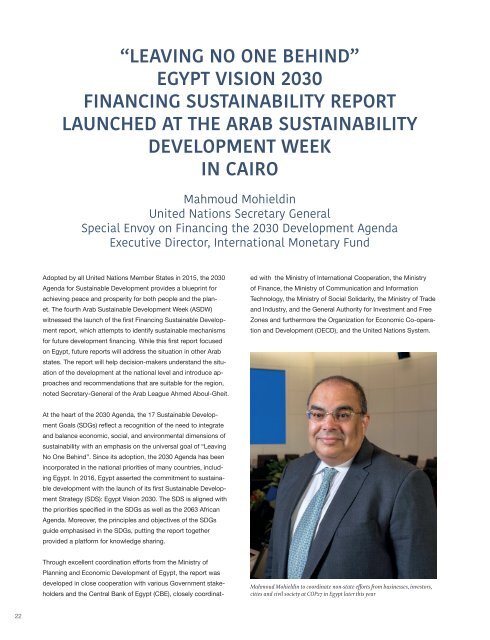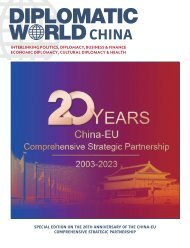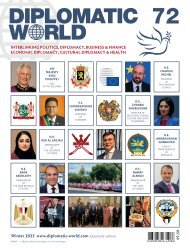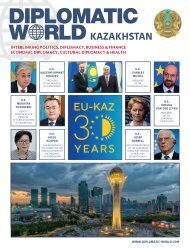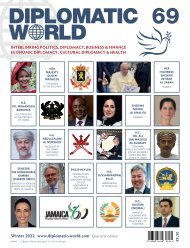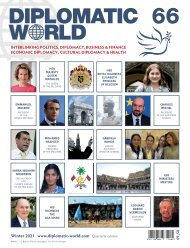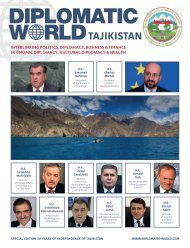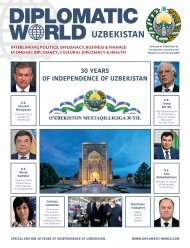Diplomatic World 67
You also want an ePaper? Increase the reach of your titles
YUMPU automatically turns print PDFs into web optimized ePapers that Google loves.
“LEAVING NO ONE BEHIND”<br />
EGYPT VISION 2030<br />
FINANCING SUSTAINABILITY REPORT<br />
LAUNCHED AT THE ARAB SUSTAINABILITY<br />
DEVELOPMENT WEEK<br />
IN CAIRO<br />
Mahmoud Mohieldin<br />
United Nations Secretary General<br />
Special Envoy on Financing the 2030 Development Agenda<br />
Executive Director, International Monetary Fund<br />
Adopted by all United Nations Member States in 2015, the 2030<br />
Agenda for Sustainable Development provides a blueprint for<br />
achieving peace and prosperity for both people and the planet.<br />
The fourth Arab Sustainable Development Week (ASDW)<br />
witnessed the launch of the first Financing Sustainable Development<br />
report, which attempts to identify sustainable mechanisms<br />
for future development financing. While this first report focused<br />
on Egypt, future reports will address the situation in other Arab<br />
states. The report will help decision-makers understand the situation<br />
of the development at the national level and introduce approaches<br />
and recommendations that are suitable for the region,<br />
noted Secretary-General of the Arab League Ahmed Aboul-Gheit.<br />
At the heart of the 2030 Agenda, the 17 Sustainable Development<br />
Goals (SDGs) reflect a recognition of the need to integrate<br />
and balance economic, social, and environmental dimensions of<br />
sustainability with an emphasis on the universal goal of “Leaving<br />
No One Behind”. Since its adoption, the 2030 Agenda has been<br />
incorporated in the national priorities of many countries, including<br />
Egypt. In 2016, Egypt asserted the commitment to sustainable<br />
development with the launch of its first Sustainable Development<br />
Strategy (SDS): Egypt Vision 2030. The SDS is aligned with<br />
the priorities specified in the SDGs as well as the 2063 African<br />
Agenda. Moreover, the principles and objectives of the SDGs<br />
guide emphasised in the SDGs, putting the report together<br />
provided a platform for knowledge sharing.<br />
Through excellent coordination efforts from the Ministry of<br />
Planning and Economic Development of Egypt, the report was<br />
developed in close cooperation with various Government stakeholders<br />
and the Central Bank of Egypt (CBE), closely coordinated<br />
with the Ministry of International Cooperation, the Ministry<br />
of Finance, the Ministry of Communication and Information<br />
Technology, the Ministry of Social Solidarity, the Ministry of Trade<br />
and Industry, and the General Authority for Investment and Free<br />
Zones and furthermore the Organization for Economic Co-operation<br />
and Development (OECD), and the United Nations System.<br />
Mahmoud Mohieldin to coordinate non-state efforts from businesses, investors,<br />
cities and civil society at COP27 in Egypt later this year<br />
Opening of the Arab Sustainable Development Week 2022 by Ahmed Aboul-<br />
Gheit, Secretary General of League of Arabic States and Minister of Planning<br />
and Economic Development Hala El-Said the Arab League headquarter in Cairo<br />
DEPENDABLE DATA, EFFECTIVE IMPLEMENTATION<br />
OF DEVELOPMENT POLICIES AND PROGRAMS,<br />
AND ADEQUATE FINANCE<br />
The report traces Egypt’s aspirations and endeavours towards<br />
achieving the SDGs, demonstrates the significant progress made<br />
by Egypt on a number of SDGs, but also that the country still<br />
faces some challenges before being on track to achieving the<br />
other goals and stresses that accelerating progress depends on<br />
three critical factors: dependable data, effective implementation<br />
of development policies and programs, and adequate finance.<br />
Designing effective and coordinated policy actions, monitoring<br />
progress, preventing and managing crises require the availability<br />
of timely, disaggregated, and good quality data to enhance evidence-based<br />
policy making. Investing in data and strengthening<br />
data systems is required.<br />
Achieving the SDGs and the national development ambitions is<br />
based on the availability of adequate financing and the alignment<br />
of both public and private financial resources. By all measures,<br />
the level of financing needs to achieve the ambitious 2030<br />
Agenda was already high even before the COVID-19 pandemic,<br />
which only added to these needs. Developing economies faced<br />
an SDG financing gap of USD 2.5 trillion per annum. This gap<br />
widened after the pandemic to spike to USD 4.2 trillion.<br />
LOW-INCOME DEVELOPING COUNTRIES LOSE<br />
AROUND 53 PER CENT OF THE RETURN ON ITS<br />
INVESTMENT TO INEFFICIENT PUBLIC INVEST-<br />
MENT MANAGEMENT<br />
According to the global study by Gasper and others, prior to<br />
COVID-19, low-income developing countries faced an average<br />
additional spending of 15 percentage points of their GDP in 2030<br />
to make substantial progress toward the SDGs in the areas of<br />
Opening of the Arab Sustainable Development Week 2022 by Ahmed Aboul-<br />
Gheit, Secretary General of League of Arabic States and Minister of Planning<br />
and Economic Development Hala El-Said the Arab League headquarter in Cairo<br />
education, health, roads, electricity, water and sanitation. For<br />
emerging economies, the average additional total spending<br />
required represented 4.2 percentage points of their 2030 GDP.<br />
Focusing on the sectors of electricity, transport, water and sanitation,<br />
flood protection, and irrigation, Rozenberg and Fay estimate<br />
that annual investments of 4.5 per cent of GDP from 2015<br />
to 2030 would allow low-and middle-income countries (LMICS)<br />
to reach infrastructure-related SDGs and stay on track to limit<br />
climate change to 2 degrees Celsius. LMICS would also need to<br />
spend around 2.7 per cent of their GDP annually in maintenance<br />
costs for their existing and new infrastructure, increasing the<br />
overall investments to be around 7.2 per cent of GDP.<br />
When being planned and implemented, investments and national<br />
projects need strong monitoring and evaluation systems in<br />
place to guarantee better public investment management and<br />
infrastructure governance. This is crucial considering the global<br />
estimates that show that an average low-income developing<br />
country loses around 53 per cent of the return on its investment<br />
to inefficient public investment management, in contrast to an<br />
efficiency losses of 34 per cent and 15 per cent in emerging market<br />
economies and advanced economies, respectively.<br />
These global SDG cost estimates need to be complemented by<br />
granular examinations at the national levels as global and regional<br />
aggregations tend to mask asymmetric access to finance and<br />
to downplay the role of policy and institutions in implementing<br />
national goals. Moreover, costing national development priorities<br />
allows countries to assess their future expenditure requirements,<br />
to plan their budgets and to pin down the additional resources<br />
that need to be mobilised. Such careful identification of the cost<br />
and of available financial flows is crucial in the Egyptian case as<br />
the country is embarking on ambitious initiatives and mega-projects<br />
that could benefit from the multiplier effects and positive<br />
externalities inherent in the SDGs.<br />
22 23


